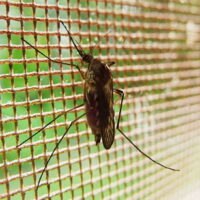SciCheck Digest
The Bill and Melinda Gates Foundation supports research into fighting malaria, including funding a company that releases genetically modified mosquitoes that are incapable of carrying the disease. But reports of locally acquired cases of malaria in the U.S. have sparked social media posts that baselessly suggest Gates was behind the recent outbreak.
Full Story
Five locally acquired cases of malaria have been found in the U.S. in recent months, marking the first time the mosquito-borne disease has been spread locally in 20 years, according to the Centers for Disease Control and Prevention. U.S. malaria cases are usually the result of international travel.
Four of the cases were found in Florida and one in Texas, the CDC said. The risk of locally acquired malaria “remains extremely low,” the CDC said, though it noted that transmission is possible in warm climates and in areas where people have traveled from “malaria-endemic” places.

There’s no evidence the cases in the two states are connected, the CDC said. It issued a health advisory for clinicians and the public, citing the locally acquired cases, concern about a potential increase in “imported malaria cases” as a result of international travel this summer and the need to plan for “rapid access” to the intravenous malaria drug artesunate.
The news has sparked a string of viral posts on social media implying that Bill Gates’ support for malaria research is responsible for the recent cases in the U.S. But that’s false.
The Bill & Melinda Gates Foundation funds efforts to fight the spread of malaria, and it has provided funding to a British biotech company, Oxitec, to release genetically modified mosquitoes in Africa that are incapable of carrying the disease.
As we’ve written before, the genetically modified mosquitoes are all male and therefore don’t bite. The idea is for them to mate with invasive, biting females. The offspring die before they reach adulthood, which means fewer biting mosquitoes in subsequent generations, leading to fewer cases of mosquito-borne diseases like malaria.
Social media posts implied that Gates-funded research involving genetically modified mosquitoes is linked to the U.S. malaria cases, though they offered no evidence. In any case, Oxitec mosquitoes couldn’t be responsible for the recent outbreak: They’re incapable of transmitting disease.
Yet musician Ted Nugent posted an Instagram reel, which received more than 6,000 likes, with a caption that read: “The government allowed 100s of thousands of genetically modified mosquitos loose in the US and now we are seeing new cases of malaria reported after years without any.” Nugent said he “thinks this is not a coincidence.”
Another Instagram reel implied a link between Gates and the malaria cases, offering no proof of a connection but saying it “sure does seem like a coincidence.” The post has more than 73,000 likes.
Oxitec has clearance from the Environmental Protection Agency and Food and Drug Administration to conduct pilot projects using its trademarked “Friendly” mosquitoes in the U.S. The company is in its third year of a Florida Keys project releasing the mosquitoes.
The company’s Florida project involves Aedes aegypti mosquitoes, which carry diseases including dengue, Zika and yellow fever — but not malaria, explained Matthew DeGennaro, an associate professor of biological sciences at Florida International University. The mosquitoes released in the Florida Keys project “have no effect on the spread of malaria,” he said in an email to FactCheck.org.
“This approach is great for Aedes aegypti, as many are resistant to our current insecticides,” DeGennaro said. “Oxitec mosquitoes have a species-specific effect. It is better than spraying pesticides that can harm other insects [and] poses no risk to human health.”
“They also do not in any way increase the risk that mosquitoes will transmit disease,” DeGennaro said.
The Gates Foundation provided funding to Oxitec for malaria projects in Africa in 2018, 2020, 2021 and 2022, according to the foundation’s website. The foundation “does not fund any work involving mosquito release in the United States,” a spokesperson for the foundation told us in an email.
Malaria is a rare and treatable disease – but potentially fatal – that’s carried by infected female Anopheles mosquitoes. It’s usually found in tropical places like sub-Saharan Africa, and it can be prevented if precautions are taken. Climate change is expected to increase the number of cases and deaths from malaria-carrying mosquitoes, mostly in Africa, according to a 2022 report by a working group of the United Nations’ Intergovernmental Panel on Climate Change.
“Higher temperatures combined with land use/land cover change are making more areas suitable for the transmission of vector-borne diseases,” including malaria, the report said, adding that “[m]ore extreme weather events have contributed to vector-borne disease outbreaks.”
The Gates Foundation’s work on malaria includes funding for nets, tests and treatment, as well as education and research on mapping and modeling malaria’s prevalence.
“Malaria eradication has been a top priority of our foundation for more than two decades, and we remain committed to devoting resources and expertise toward the goal of ending the disease for good,” the foundation’s spokesperson said.
Editor’s note: SciCheck’s articles providing accurate health information and correcting health misinformation are made possible by a grant from the Robert Wood Johnson Foundation. The foundation has no control over FactCheck.org’s editorial decisions, and the views expressed in our articles do not necessarily reflect the views of the foundation.
Sources
Centers for Disease Control and Prevention. “Locally Acquired Malaria Cases Identified in the United States.” 26 Jun 2023.
Bill & Melinda Gates Foundation. “Committed Grants. Oxitec.” Accessed 17 Jul 2023.
Schipani, Vanessa. “GMOs Didn’t Cause Zika Outbreak.” FactCheck.org. 23 Feb 2016.
Oxitec. “Oxitec’s Friendly™ mosquito technology receives U.S. EPA approval for pilot projects in U.S.” Press release. 1 May 2020.
Oxitec. “FKMCD-Oxitec Mosquito Project Launches Final Phase of 2023 Project Season.” 3 Jul 2023.
Matthew DeGennaro. Associate professor of biological sciences. Florida International University. Email to FactCheck.org. 17 Jul 2023.
Bill & Melinda Gates Foundation. Spokesperson, email to FactCheck.org. 12 Jul 2023.
World Health Organization fact sheet. “Malaria.” Accessed 17 Jul 2023.
Intergovernmental Panel on Climate Change. “Climate Change 2022.” Accessed 17 Jul 2023.
Bill & Melinda Gates Foundation. “Malaria.” Accessed 17 Jul 2023.

